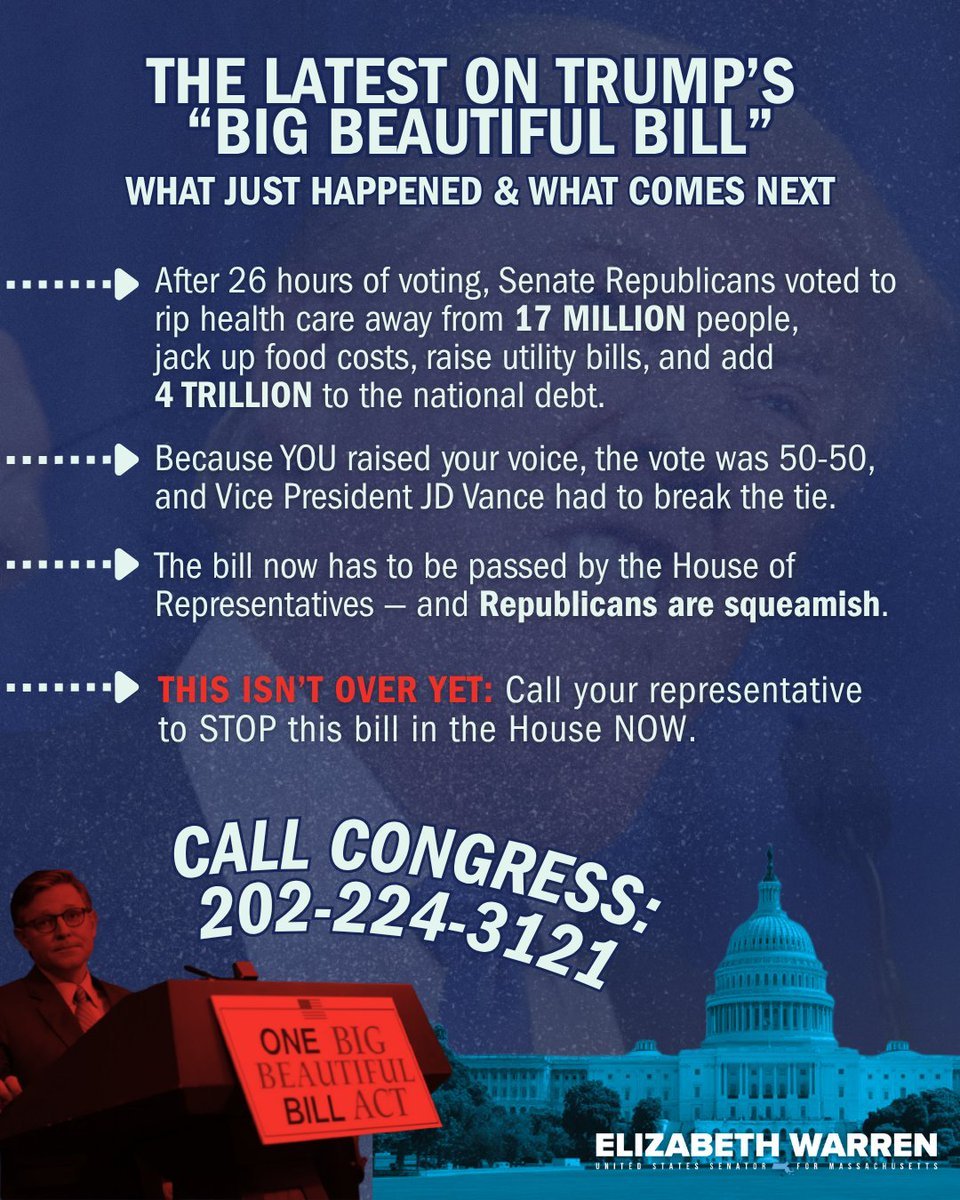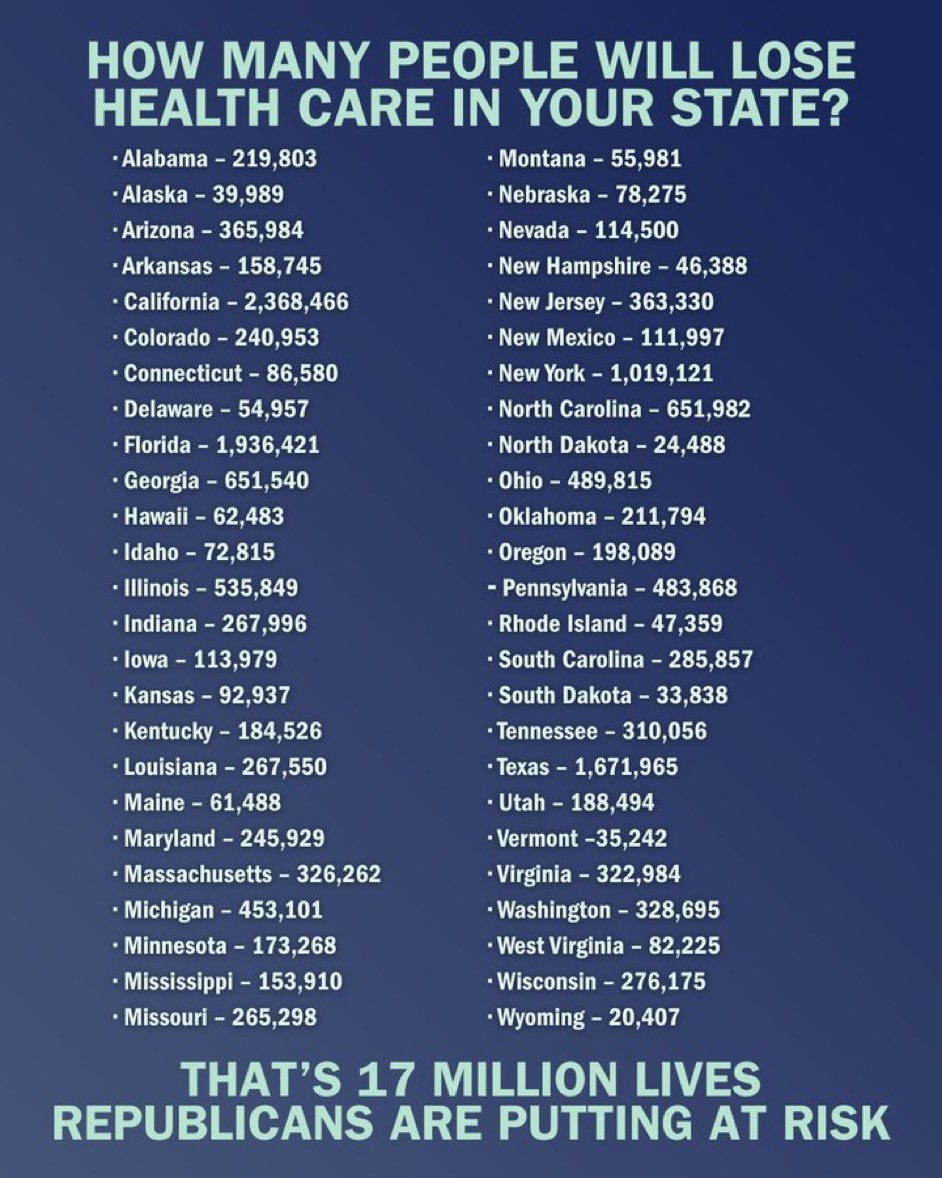Wednesday, July 2, 2025. Annette’s Roundup for Democracy.
Why not pick a Senate seat as your own favorite for 2026?
We need to turn 4 red seats blue in 2026 to take back control of the Senate and stop Trump.
North Carolina where Republican Senator Thom Tillis recently announced he will not run for re-election could be a winning choice.
Will you make North Carolina your #1?
- Whose campaign will receive the largest donation you can make?
- Whose campaign news and ads will you post on your social media?
- Whose campaign will you volunteer for - in person, or with calls, or postcards, or all 3?
Develop a plan to support Roy Cooper now!

Mr. Cooper is by far the most popular Democrat in North Carolina. He is undefeated as a statewide candidate, having won four elections as attorney general and two as governor. In 2012, Republicans did not even bother to put up a candidate against Mr. Cooper.
With Tillis Out, North Carolina’s Senate Race Will Draw Parties’ Firepower
A popular former Democratic governor, Roy Cooper, is expected to announce a bid this summer. The Republicans are banking on an endorsement by President Trump to clear their field.
The announcement this past weekend from Senator Thom Tillis of North Carolina that he will not seek re-election is renewing the focus on a Senate race that was poised to be one of the two top contests on the 2026 midterm map.
For months, Democrats were eager to run against Mr. Tillis, who was being squeezed from both the political left and right as he sought to navigate life as a battleground-state senator with President Trump in the White House.
Officials in both parties acknowledged that Mr. Tillis was in a weakened political state. He won his last re-election in 2020 only after his Democratic opponent was engulfed in an extramarital sexting scandal, and he has long had an arms-length relationship with the Trump base of his party.
In recent months, several North Carolina Republicans have inquired about either mounting a primary challenge to Mr. Tillis or seeking the nomination with the expectation that the senator would not run again.
Democrats, for the most part, have yielded to their expected front-runner, former Gov. Roy Cooper, who left office at the start of this year. During his farewell address to the state in December, he pointedly declared: “I’m not done.”
Here are four key questions about North Carolina’s Senate race.
Will former Gov. Roy Cooper run?
Mr. Cooper is by far the most popular Democrat in North Carolina. He is undefeated as a statewide candidate, having won four elections as attorney general and two as governor. In 2012, Republicans did not even bother to put up a candidate against Mr. Cooper.
No other Democrats running or in consideration can match the name recognition or the fund-raising ability of Mr. Cooper, a former chairman of the Democratic Governors Association.
Former Representative Wiley Nickel, who served one term before his district was redrawn by North Carolina’s Republican-controlled legislature, announced in April that he would seek the seat.
Since leaving office in January, Mr. Cooper has taught a class at Harvard’s public health school, where Republicans had a tracker follow him with a camera and sit in on some classes.
He has said for months that he will announce a decision on the Senate race this summer. On Monday, Mr. Cooper’s political adviser, Morgan Jackson, said he “continues to strongly consider a run for the Senate and will decide in the coming weeks.”
Will there be a messy Republican primary now?
Not if the party can help it.
While Mr. Trump has so far avoided picking a candidate in Republican primaries in Michigan and Texas, party officials hope — and believe — he will anoint someone as his choice in North Carolina.
Republicans to watch so far include Michael Whatley, who has won Mr. Trump’s endorsement before, when he became the Republican National Committee chairman; Lara Trump, the president’s daughter-in-law, who weighed a Senate run in North Carolina in 2022 and who was briefly in the mix to replace Marco Rubio in Florida when he was named secretary of state; and members of the state’s congressional delegation, in particular Representatives Richard Hudson and Pat Harrigan.
It is unlikely that any of those four will run against a Trump-endorsed primary candidate. Mr. Whatley is considered to be the party’s early front-runner. Party officials are skeptical that Ms. Trump, having passed on two opportunities to seek a Senate seat, will do so now. She recently signed deals to host a weekend show on Fox News and to contribute to Salem Media, the conservative radio network.
Will Tillis’s decision change the race?
Probably not all that much.
Mr. Tillis was already considered to be one of the two most endangered Senate Republicans, along with Senator Susan Collins of Maine, who has weathered being a top Democratic target before. Now Republicans are likely to have a candidate who has not drawn the anger of the party base like Mr. Tillis, but will also come without his track record of winning and statewide name recognition.
“President Trump has won North Carolina three times, and the state has been represented by two Republican senators for over a decade,” said Senator Tim Scott of South Carolina, the chairman of the Senate Republicans’ campaign arm. “That streak will continue in 2026.”
Will North Carolina matter in the fight for the Senate majority?
Democrats must win the state if they have any hope of seizing a majority in the chamber after the midterm elections. Republicans now hold 53 seats, and Vice President JD Vance holds the tiebreaking vote, so Democrats would need to flip at least four seats in 2026 to take control.
If the party held its battleground seats in Georgia and Michigan, it would most likely have to win North Carolina, Maine and then two other red states. Some Republicans have begun to worry about Texas, especially if the state’s attorney general, Ken Paxton, beats Senator John Cornyn in the primary.
After that, the party would need to cash a lottery ticket somewhere like Alaska, Iowa, Mississippi or Nebraska — all long shots, even in a year in which Democrats are on offense against Mr. Trump and Republicans. (New York Times)
One more thing.
Has there ever been as vulgar, materialistic or self-serving an occupant in the White House as this loathsome beast!
Here he is, folks. The President of the United States selling his new men’s cologne for $199 and women’s perfume for $249. pic.twitter.com/w48dQQ8cod
— Ron Filipkowski (@RonFilipkowski) June 30, 2025
Aside from being a crude and vulgar grifter, Trump is more dangerous, with no boundaries set by the law, each day.
First he threatens Elon Musk.

Then he threatens American citizens.
Touch to watch.👇
BREAKING: In a shocking moment, Trump -- who was convicted of 34 felonies -- calls for the deportation of US citizens. "We also have a lot of bad people that have been here for a long time ... many of them were born in our country."
— Really American 🇺🇸 (@ReallyAmerican1) July 1, 2025
You first, Donald.pic.twitter.com/fjqTbvKlri
The fight on Trump’s disgusting bill passed the Senate 51-50, with Vance breaking the tie.
It now goes to the House, where ironically we have to hope the worst of the worst “conservative, “ “deficit hawk” Republicans will reject it for one reason only, because it grows the deficit.

We still have a role to play too.


—————-
Senator Lisa Murkowski betrayed herself and our nation and voted yes.
Can you believe Senator Susan Collins didn’t?
BREAKING: In a stunning moment, Republican Senator just admitted Donald Trump’s reconciliation package is awful despite voting for it. This is insane. pic.twitter.com/atmNvwMB0V
— Democratic Wins Media (@DemocraticWins) July 1, 2025
🚨NEW: GOP Senator Lisa Murkowski has cast deciding vote to pass the “Big Beautiful Bill” in the U.S. Senate, which will cut health care coverage for millions of Americans.
— Protect Kamala Harris ✊ (@DisavowTrump20) July 1, 2025
RETWEET if you think @LisaMurkowski is a coward! pic.twitter.com/OlISi6GPHo
One more thing.


This headline from the New York Times last night is one of your strong arguments.

This next headline from the Times is your second winning argument.

The New Head of the Ford Foundation didn’t throw a white flag to Trump and Vance.
We likely will see a brawl begin.
To quote from the article below 👇 to learn what we might expect, “As a candidate for Senate, Vice President JD Vance told Fox News that Ford and other foundations were ‘fundamentally cancers on American society, but they pretend to be charities.’ Mr. Vance then asked why Ford should not have its assets seized.”
Ford Foundation’s New Leader Says She’ll Work to Protect Democracy.
Heather K. Gerken, the dean of the law school, will run the powerful philanthropy, known for pushing for social justice.

Heather K. Gerken, the dean of Yale Law School, will become the president of the Ford Foundation later this year, the group said Tuesday.
Ms. Gerken, who was seen last year as a contender for the Yale presidency, will take over one of the country’s wealthiest and most influential philanthropies at a time of especially fraught debate about social justice and inequality, two of the foundation’s touchstones.
In a statement on Tuesday, Ms. Gerken said she was looking forward to working at the foundation “to protect democracy and the rule of law and further our mission to create a more just and fair world for everyone.”
Ms. Gerken will succeed Darren Walker, who announced last summer that he would conclude a 12-year tenure in 2025. About a decade ago, he began to redirect Ford’s philanthropy toward combating inequality, writing then that the foundation would work on “not just wealth disparities, but injustices in politics, culture and society that compound inequality and limit opportunity.”
It was a shift in focus for the philanthropy, which was founded in 1936 by Edsel Ford, the only child of Henry Ford, the auto magnate. For many decades, the foundation’s giving was wide-ranging. An early grant helped create what ultimately became PBS, and the foundation went on to spend on everything from orchestras to disaster relief. In 2014, after the City of Detroit filed for bankruptcy, the foundation was at the center of a daring effort that limited the cuts to retired city workers’ pensions and protected the Detroit Institute of Arts. (The foundation, whose endowment is valued at roughly $16 billion, has also supported journalism programs, including some at The New York Times.)
The Ford Foundation remained a powerhouse after it adjusted its focus. In its most recent publicly available tax return, it reported spending more than $600 million on contributions, gifts and grants, with hundreds of millions more scheduled to be paid in the future. Much of the money recently has gone toward projects it classifies as related to “civic engagement and government,” but it still spreads its largess on an array of initiatives.
In June, for instance, grant recipients included the American Civil Liberties Union’s foundation in Louisiana, the Clinton Foundation, Jazz at Lincoln Center, the National Down Syndrome Congress and Spelman College.
But the foundation has powerful critics who have called for changes to its tax status. As a candidate for Senate, Vice President JD Vance told Fox News that Ford and other foundations were “fundamentally cancers on American society, but they pretend to be charities.” Mr. Vance then asked why Ford should not have its assets seized.
Ms. Gerken is expected to take over in November, leaving Yale before her second term was scheduled to conclude in mid-2027.
Ms. Gerken, who earned a law degree from the University of Michigan, clerked for Justice David Souter, worked in private practice and taught at Harvard Law School before her arrival at Yale. After more than a decade there, she became dean in 2017. She won wide praise for increasing enrollment of veterans and a program covering law school tuition for scores of low-income students.
She also led a revolt against the law school rankings published by U.S. News and World Report, a cultural juggernaut in its own right. Even though Yale’s law school had been a fixture in the top spot of the rankings, Ms. Gerken argued that the for-profit publisher relied on an arbitrary formula that led law schools to shape their priorities to match a publisher’s preferences and whims.
In November 2022, Ms. Gerken said that Yale’s law school would no longer respond to U.S. News’s requests for data that helped power its rankings. Harvard made a similar announcement soon after, and dozens more medical and law schools followed.
U.S. News has continued to rank law schools — its latest list has Yale and Stanford tied for best in the nation — but the uprising dented the publisher’s brand.
During Ms. Gerken’s tenure, Yale Law School has occasionally drawn sharp criticism. In 2022, for instance, after student protesters disrupted a Federalist Society event, two federal appeals court judges accused the school of hostility toward conservative speech and said they would not hire its graduates for clerkships.
The judges, both appointees of President Trump, later agreed to speak at Yale.
More recently, the law school ousted a pro-Palestinian activist, Helyeh Doutaghi, from her role as deputy director of the Law and Political Economy Project after a website that described itself as “empowered" by artificial intelligence accused her of membership in a terrorist group. Dr. Doutaghi denied wrongdoing and told The Times in an interview this year that she was “not a member of any organization that would constitute a violation of U.S. law.”
Yale fired Dr. Doutaghi within weeks, saying it was acting because she refused to aid in its investigation of the matter. The school’s decision sparked an internal backlash, and some of Dr. Doutaghi’s former colleagues accused Yale of a “fear-based and excessive” reaction.
Still, Ms. Gerken’s background in constitutional law — in 2009, she wrote “The Democracy Index: Why Our Election System Is Failing and How to Fix It” — appealed to the foundation’s leaders and supporters as they searched for Mr. Walker’s successor.
Statements from Ms. Gerken’s allies, which Ford distributed on Tuesday, suggested that they expect the foundation to have a sustained focus on preserving democratic norms under her leadership.
Christopher L. Eisgruber, Princeton University’s president, said Ms. Gerken, an alumna of the university and a trustee, was an ideal choice “in a moment when constitutional democracy needs urgent attention and engagement.”
J. Michael Luttig, a former federal appeals court judge and a titan of the conservative bar who has sharply criticized Mr. Trump, was even more effusive.
“Wherever there is hope, promise, and common cause to be found for an embattled and beleaguered nation and world, Heather Gerken will find it,” he wrote. (New York Times).